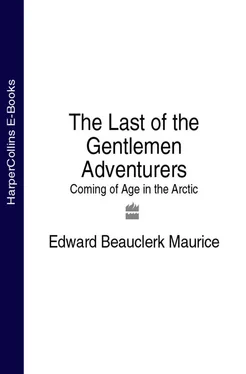Our job was to carry the goods down the full length of the jetty and then across to the store, which was situated beyond the dwelling house. It was hard work and a very long way to those not used to carrying heavy weights, which seemed to be most of us. Under my first sack of flour I nearly sank to my knees, but managed to hold up, much to the disappointment, I am sure, of the first mate, who was standing near by with a grin all over his face waiting for one of us to make a fool of himself. Adding considerably to our discomfort was the fact that the place was infested with vicious mosquitoes, which descended upon us in veritable clouds to sample the blood of the newcomers, so that our first day’s work on the Labrador coast was misery endured rather than a brave step forward.
The apprentice at Cartwright had come out from Scotland two years previously and he warned us not to expect any home comforts. On the evening of his arrival, he had asked the manager where his bedroom was. He had been taken down to the store, shown a mattress squeezed in behind the counter and told that that was his bedroom. He warned us too that a greenhorn in the Arctic was fair game for everyone, especially the old-timers. During his first winter, he had slightly frozen his big toe and had in due course lost the nail. An apparently knowledgeable colleague at the post told him that he must strap the black nail back on to his toe for at least three months, after which time it would have grown back on again. According to our friend he had done this at very great discomfort and not until several weeks later did he discover that his leg had been pulled. I think most of us thought ourselves too clever to be caught out like that, but it was not easy to resist the insistent advice of experienced people, however bizarre it seemed.
The unloading took about twenty-four hours, working quite late into the night and resuming again at daybreak. The mosquitoes attacked relentlessly, but our loads seemed to get less heavy as our muscles became more and more used to the strain, although we were all glad when the last case had been safely deposited in the store. The Ungava did not sail at once, so we had an opportunity to look round our first Hudson’s Bay Company post.
We visited some of the shacks dotted about on the flats. It was rather like stepping back in time, for these homes could well have belonged to a much earlier era. The first thing that met the eye were the outsize texts hanging near the entrance and at other strategic points inside. ‘THE WAGES OF SIN ARE DEATH’, ‘GOD IS LOVE’, ‘JUDGE NOT THAT YE BE NOT JUDGED’ and other sombre messages set the tone. The occupants sat in their homes, prim and formal, surrounded by their possessions as though they were relics of the Victorian peasantry somehow strayed into the twentieth century. They appeared to be of European descent, with perhaps some intermingling of Indian blood and possibly Innuit as well. They understood some English, but could not be drawn into anything but the most conventional conversation.
During the morning of our departure from Cartwright, the man in charge of our group summoned me to his cabin and told me that I was to become the apprentice at a post called Fort Chimo, a small but long-established settlement situated at the head of Ungava Bay. He advised me to seek the advice of a passenger who had just joined us to travel along the coast and who had spent several years at Chimo. Ian Smith was to go to a nearby post, so he joined me in seeking out this man, Bill Ford by name.
We found Bill asleep in his cabin and at first he did not seem to be too pleased at having his rest interrupted, but he mellowed when he discovered we had brought a couple of bottles of beer with us. He sat drinking the beer and dangling his legs over the bunk.
‘Years ago,’ he said, ‘Chimo was almost a small township. The post staff was much larger than it is nowadays. They had people to make barrels, carpenters, interpreters. There were opposition trading companies, a school, a hospital and government officials.’
‘How did the company people get on with the opposition?’ asked Ian.
‘They didn’t have very much to do with each other,’ replied Bill, ‘they didn’t fraternize. If anything went wrong for one of them, the other was always very bucked about it. I remember once that during a gale a boat belonging to the French company Revillon Frères broke away from her moorings. It was a big boat too, about five tons, and the company chaps gathered along the river bank to cheer as she drifted past. The thing went right out to sea and it was several days before they got her back again, with a hole stove in her bow just above the waterline where she had hit a rock.
‘There aren’t many opposition posts left now though. There hasn’t been enough trade for more than one company for the past few years at Chimo and rumour has it that Revillon Frères will be pulling out before long.’
I asked him about the natives in Ungava Bay.
‘The Eskimos live around the shores,’ Bill replied, ‘and the Indians have their camps inland. They’re quite friendly and don’t really come into contact with each other very much. There’s never been any trouble as far as I know. Round the bay, where the Eskimos live, the land is very flat – sometimes I used to wish that the hills were a little higher. The wind comes down from the interior and whistles round the houses during the winter. We had some fair old blizzards. In a real blizzard, you have no idea where you are, the wind can keep changing and you can’t see a thing. One of the Chimo missionaries got caught once coming back from a visit to his flock. He and his Eskimo driver dug themselves into the snow, after struggling as far as they could. They were miserable in what was little better than a hole in the ground for two days. On the third day they were amazed to hear the sound of church bells coming from near by and they struggled out of their holes to find that they had camped almost alongside the missionary’s own house. The bells they had heard was his assistant ringing for the morning service.’
We soon found that Bill Ford, who had spent most of the previous winter alone, inland from Cartwright, needed little persuasion to launch off into his stories of the Labrador coast and Ungava Bay. Sometimes it was quite difficult to stop him, but both Ian and I felt that he never did try to make fools of us, a pastime to which many old-time northerners were willing to devote a considerable amount of time.
We made several stops during our voyage along the Labrador coast. At Makkovik, my star did not at first seem to be in the ascendant. Wearing a new beret, purchased under the French influence of the Montreal shops, I felt quite jaunty as I reached the bottom of the gangway and prepared to climb into the first boat ashore. Unfortunately, at that precise moment the fastening, or whatever it was that held the bottom step in place, broke. The step tilted up into a vertical position, allowing me to slide, quite gracefully they told me, into the water. My efforts to grasp something as I went down simply resulted in me pulling the step back down into position over my head. I was able to tell my friends later that although the water looked calm and inviting enough for a swim, it was really too cold to be enjoyable.
Later on during the afternoon, I rejoined the working party on shore and they kept up their ribaldry at my expense for the rest of the day. We finished the work before teatime and a pleasant surprise awaited us, for the post manager told us that his wife wanted us to go and have a meal with them instead of going back to the ship. His wife, a jolly, cheerful person, did not seem to mind how many of us came. She had cooked a huge dishful of cod steaks in batter and on the table was what looked like an old-time washbasin full of crisp chips. She just stood back and let us help ourselves, laughing with delight at our obvious appreciation. When the fish had all gone, the lady produced an outsize apple pie, then cake and bread and jam for any unfilled corner. She seemed much concerned about my plunge into the sea. Had I dried myself properly? What about my clothes? What was the Hudson’s Bay Company thinking of, bringing children up into the Arctic? I rejected the suggestion that I was a child at sixteen, but she shook her head and said that it was a hard life and a very lonely one.
Читать дальше












